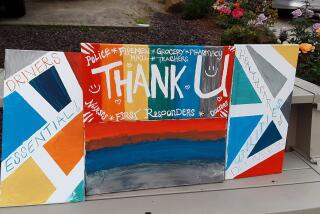A Few Find the Spotlight, but Everyday Heroes Labor for Us Unrewarded
- Share via
Year end. Time for counting blessings, praising heroes.
Time magazine wrestled over its Man of the Year and selected the Earth, apparently afraid that choosing Mikhail S. Gorbachev would annoy George Bush and vice versa. But the Carnegie Hero Fund found plenty of contenders for its annual awards. Some of them are dead for their heroism.
Two men jumped 40 feet from a bridge to pull a truck driver from a Louisiana swamp. Two boys died trying to save their brother who had fallen through the ice in Missouri. Two men died trying to save a co-worker on a drilling rig in Texas. A Cleveland man died trying to save his nephew in a house fire. A Hyattsville, Md., man was badly burned when he stepped in front of the gasoline thrown by an attacker on a co-worker.A Nebraska man saved two policemen by grabbing a suspect’s arm before he could fire a pistol.
Carnegie chose 20 heroes in all--Americans who risked their lives so that others, sometimes strangers, might live. How many of us know that, if the time comes, we could be so brave? None of us know for sure. Theirs is the kind of courage that flares in a moment, driven by adrenalin, too fast for all the pros and cons to be considered. When it is over, the heroes themselves sometimes wonder how they did it.
The Carnegie commission’s heroes ranged from 8-year-old Stephen Douglas Gregg of Buckner, Mo., to 65-year-old Merle Edward Watkins of Pittsburgh. Interestingly, all were men--a word that I use advisedly--although Stephen, his brother Chad and Roger Dale Jackson, 16, of Joanna, S.C., were under voting age. Perhaps it just happened that way this year. Perhaps male hormones are more likely to send a rescuer plunging off a bridge or into a flaming building. Perhaps the commission is not attuned to other forms of heroism. I can’t say.
I can say, though, that once-in-a-lifetime heroism like that honored by Carnegie is probably not as hard as the everyday kind achieved by thousands of other Americans this year. Many of them are women. None of them got an award.
In the Northern Virginia phone book there are almost 700 listings under the name of Nguyen. They are Vietnamese-Americans, most of whom came here after Saigon fell in 1975. Many were boat people who set themselves and their families adrift in the South China Sea, gambling that they would be found and then find freedom. There are hundreds of other Vietnamese in the book, and Cambodian-Americans who survived the killing fields and the horrors of refugee camps before they made their way here.
We read often of how Asian-American students are outdoing their classmates in high school and college,to the extent that some universities are accused now of setting quotas to save places for native-born students. What is less obvious is that behind these mathematics and science whizzes are parents who arrived here with no English, whose education was of little use, who are scrubbing floors or shoveling ashes, working two jobs each, setting the example that motivates their children.
We are bombarded with news about drug wars, murders and robberies in the inner cities. Sociologists make careers of studying the breakup of the black family, the disappearance of the positive male role model for ghetto children. We seldom note that, despite all that, there are such children who stay clean, and grow up educated and confident and that behind them there are mothers who scrabble to keep them going, despite all.
We cheer at medical breakthroughs, and splash triumphant researchers onto Page 1. We see little of the nurses and public-health doctors and volunteers who work for scant or no pay, chancing daily that they will bring home one of the incurable diseases that they are treating. We may praise or condemn, but we surely notice, the preachers who become public figures for their sermons or their sins. Only locally and quietly do we appreciate the churchmen and churchwomen who help the needy and have never faced a TV camera.
Daily, locally, quietly. Those words describe the kind of heroism that makes America what it is in crisis or in routine, wartime or peace. They cover cops, teachers, laboring folk, people who get up every morning to do hard, unfashionable things that will never bring a bonus or an award. There are not enough medals to decorate them all.


